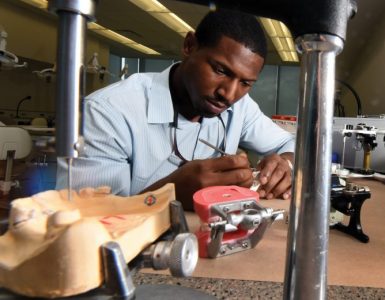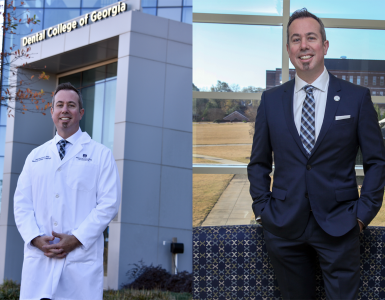Students Seek to Increase Minority Representation
Several students at The Dental College of Georgia have dedicated extensive time and energy lately challenging the public to consider a seemingly simple concept: Do you consider your health care providers relatable?
People who pursue health careers often cite the inspiration of a caring physician or dentist they knew growing up. Of course, the more relatable that health care provider was, the more likely he or she was to serve as a role model and help the patient envision following in those footsteps. So who are the role models for children who look significantly different, or speak a different language, or have a different culture than those providing their care?
That’s but one of many compelling considerations and reasons to embrace diversity and inclusion in health care, according to the students, members of the DCG chapter of the Student National Dental Association. The students hosted Impressions Day March 5, introducing over 100 undergraduates nationwide to the dental profession. The undergraduates, members of underserved and under-represented minorities, spent the day learning about the admissions process, interacting with mentors and meeting faculty and administrators.
“Diversity and inclusion are critical components of the effective delivery of health care,” says Cornelius Daniel, historian of the DCG chapter. “It provides a sense of relief for patients and helps build confidence and trust in the profession.”
Atijah Collins and Marcus Cowan, president and vice president of the chapter, respectively, concur. “The underrepresentation of minority groups impacts the effective delivery of dental education by excluding representation of some of the most at-risk populations in America,” Cowan says, adding chapter members are heartened that the Impressions Program, hosted by the college annually for 19 years, is helping remedy the problem.
Hispanics, African-Americans and Native Americans have significant oral health disparities, according to the U.S. Centers for Disease Control and Prevention. The problem is exacerbated by underrepresentation of these groups in dental schools, both among students and faculty, says Daniel. “The dental profession must seek to increase those numbers and provide innovative strategies to bridge the gap,” he says.
Collins and Cowan also addressed the issue during the American Dental Education Association national meeting recently in Denver, contributing to a presentation at a Student Diversity Leadership Program as DCG representatives. “We discussed many issues and trends that affect a student’s experience while matriculating through dental school,” Collins says. “The program emphasized developing an inclusive cultural climate in dental schools. It was very inspiring to meet other motivated students from diverse backgrounds who have the same goal of increasing minority enrollment and retention in dental school.”
The chapter members are gratified that the college “has been on the forefront, and a strong leader, in the push for more diversity,” and they hope to help intensify those efforts.
Says Collins, “There must be a more directed and strategic approach to address these inequalities.”








